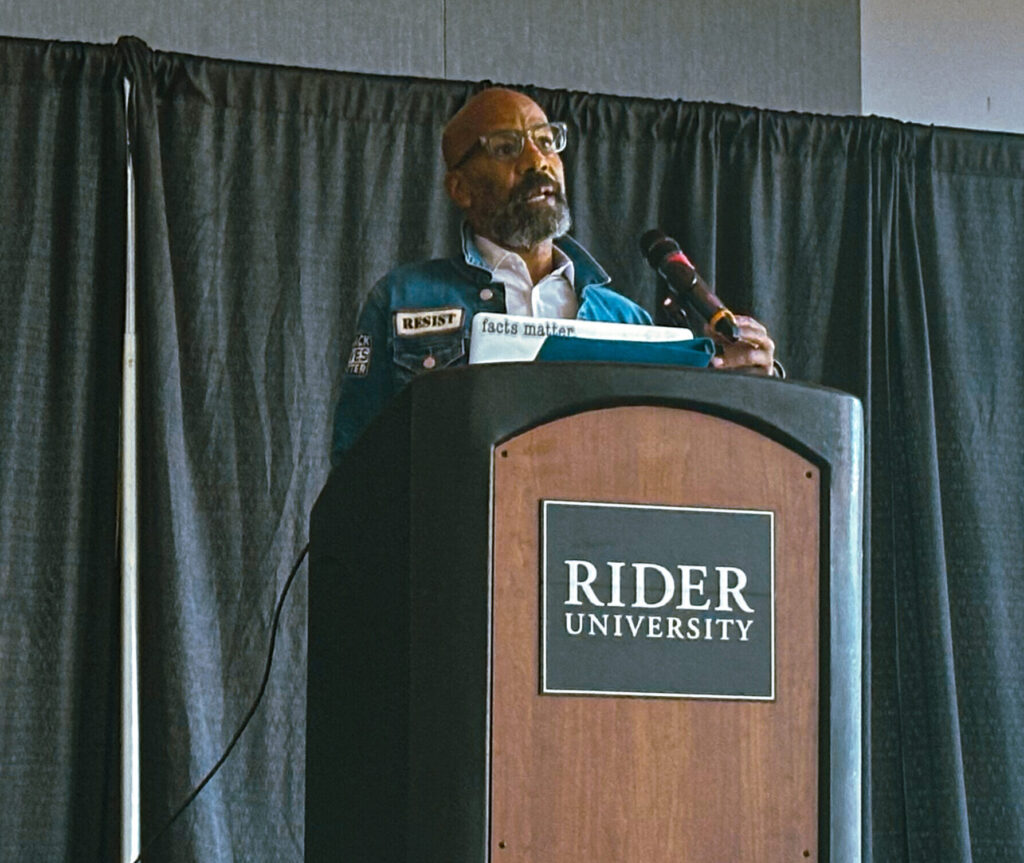caroline havilland
On Oct. 17, Kevin Blackstone stood in front of a crowd and students spoke about the prevalence of sports in culture and how, contrary to conventional wisdom, it is not the force for social change that many believe. I was preparing to hear what Mr.
“We’ve long promoted the idea that sport is a vanguard of social change. That’s not necessarily true,” Blackstone said.
Above his head was a projector screen that read “Sports Myths and Sports Journalism Mythmaking.”
Blackstone has spent his career researching this subject and observing it during his childhood. He grew up a fan of Washington’s NFL team, which recently changed its culturally insensitive name.
Junior radio and podcasting major Owen McCarron introduced Blackistone at the event.
“As the sport continues to grow and the world landscape continues to grow, it’s important to remain calm and continue to learn about bigger issues than who bought the referees and why the Jets can’t win a Super Bowl. It’s important,” McCarron said.
Mr. Blackstone, an award-winning sports columnist for the Washington Post, a panelist for ESPN, and a professor at the University of Maryland’s Philip Merrill School of Journalism, believes in “demythologizing” the stories told in sports journalism. ” I came to Ryder to do it.
The story begins with a familiar name in the sports world: Jackie Robinson.
“American Pastime”
The baseball world has commemorated Robinson as a keystone in the fight against racial discrimination in the United States. His number 42 was retired by MLB in 1997, and April 15 was designated as Jackie Robinson Day. What sports media is missing from this basic story, Blackstone said, is what happened to the “previously Jackie Robinsons.”
In 1883, before Robinson even took the bat, Moses Fleetwood Walker became Major League Baseball’s first African-American player, joining the Toledo Blue Stockings. Blackstone said that Walker’s participation faced resistance from Cap Anson, an influential figure in 19th century baseball, and that Anson’s protests “drawn the color line” and continued for decades to come. Many people continued to follow it.
“We in the media have been telling people that Robinson was the first black player to play in the major leagues, but we rarely, if ever, tell them about Fleetwood Walker and Cap Anson,” Blackstone said. said. “America’s pastime is watching games where only white men are allowed. One of the greatest script flips in history.”
Robinson’s integration in 1947 was part of a series of events in the 1940s civil rights movement. His story further strengthens the idea that sports have been slackers rather than leaders on racial justice.
“Whitewashed” journalism
Sports journalism in the United States began in 1819 with the American Farmer Magazine, the first periodical dedicated to sports. This publication spawned numerous publications over the next 15 years, all of which were owned and operated by white men.
“This is how the racial roots of sports journalism in the United States were laid,” Blackstone said. “The racial roots of sports journalism in the United States have always been and continue to be primarily white men’s interpretations of the performance of black athletes.”
Blackstone gave examples of sports journalists endorsing racist stereotypes based on research conducted in the late 20th century. Black athletes have been praised in the media for their natural athletic ability, such as Michael Jordan being praised for his “athletic ability,” but white athletes have been praised for their intellect, such as Larry Bird’s “brilliant play.” has been expressed by.
Racial injustice in sports can be identified separately from player discrimination. According to Blackstone, more teams in sports than any other in society, such as the NFL’s Kansas City Chiefs and the NHL’s Chicago Blackhawks, appropriate indigenous culture and imagery in their team names, mascots and logos. It is said to have been “whitewashed”. .
“You can’t talk about systemic racism in this country without understanding what happened to Native Americans after[Columbus]touched these shores,” Blackstone said. “Sportwash didn’t start with golf. It’s been around for a long time.”



